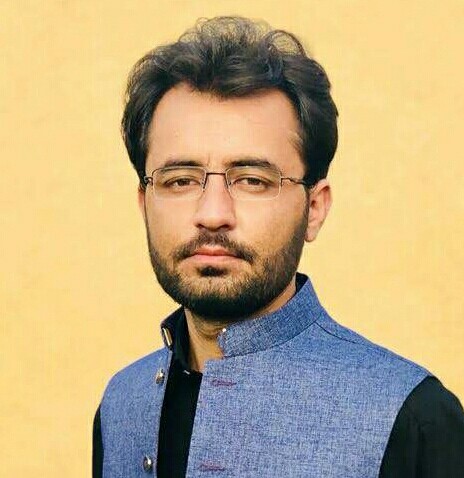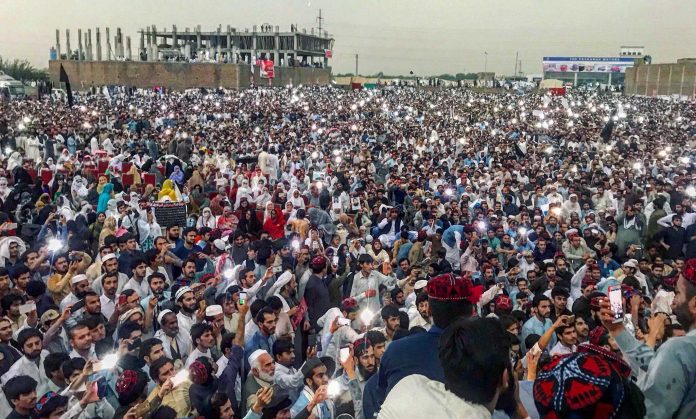Pashtun Tahafuz Movement (PTM) or Pashtun Protection Movement is a rights-based movement originated in early 2018 when an aspiring model Naqeebullah Mehsud from Waziristan was brutally killed by Police in a fake encounter in Karachi in January 2018. The encounter was headed by so called “encounter specialist” Rao Anwar. A high-level inquiry committee was set up to probe the encounter. The committee in its report declared that the encounter was fake and Naqeebullah was innocent.
PTM under the leadership of Manzoor Pashteen (Human rights activist) called for march towards Islamabad. Thousands of young Pashtuns joined the march in the capital city, demanding justice and end to racial discrimination against Pashtuns.
In the beginning, PTM had the following main demands: 1) the removal of land mines from the tribal districts (FATA), 2) arrest of Rao Anwar and initiation of judicial inquiry against him, 3) judicial investigations to invest extra-judicial killings, 4) the abolition of Frontier Crimes Regulations (FCR), 5) forced disappearances should be stopped and missing persons should be presented before court for trial.
Pashtuns (second largest ethnic group in Pakistan) have been living at the heart of never-ending wars. They inhabit both in Pakistan and Afghanistan. Since the 1980s, at least three generations of Pashtuns have been suffering from Islamic extremism, militancy and proxy wars. First, they were the target of the Cold War rivalry between the US and the USSR, then fight between the West and the terrorists made them homeless.
Due to the rise of militancy in the tribal areas, the tribal Pashtuns have been both directly and indirectly affected. People are losing lives and living in fear as a result of Pakistani military operations, and the U.S. drone strikes.
Instead of addressing young Pashtuns, military spokesperson Major General Asif Ghafoor accused PTM of being funded by foreign intelligence, like India’s Research and Analysis Wing (RAW) and afghan intelligence agency, National Directorate for Security (NDS). He said, “The way they are playing into the hands of others, their time is up,”.
To silence them down, several PTM activists have been jailed, while some have been included in the no-fly list. PTM leader, Manzoor Pashteen has been barred from travelling to some parts of the country.
On 26 May, army personnel opened fire on peaceful rally of PTM, which resulted in the killing of at least 13 protestors and dozens injured. Military spokesperson alleges that PTM members attacked army check post, and soldiers opened fire in self-defense. After this event, Ali Wazir and Mohsin Dawar – leaders of PTM were arrested.
Ali Wazir one of the prominent members of PTM writes, “I want to reiterate, for the record, that we do not have a retrogressive or subversive agenda against Pakistan. We are not seeking secession, and we do not follow any political ideology that would require a radical transformation of the state or society in Pakistan. We are, however, among the worst victims of terrorism in Pakistan, South Asia, and the world, and we are seeking justice for the wrongs and atrocities we have endured for so long and continue to face”.
The leaders of the movement have repeatedly underscored that neither is the PTM carrying an anti-state agenda, nor would it allow violent means to have its demands accepted. This was highlighted in one of the rallies of the PTM where the leadership said, “All our demands and activities are in accordance with the philosophy on non-violence. We have so far not disturbed the lives and occupations of ordinary citizens during all our previous rallies”. Ali Wazir, another leader of the PTM, has said that the PTM “wants the state to recognize us as equal citizens and grant us everything that goes with that”.
There is no doubt, PTM has emerged as a voice of the voiceless. The movement has given hope to young Pashtuns, who were hopeless due to years of discrimination by the state. Instead of playing blame game, both civil and military officials should engage with PTM. The state should embrace young Pashtuns as their own people and do not allow foreign players to manipulate the peaceful movement.
The views and opinions expressed in this article are those of the author and do not necessarily reflect the official policy or position of The Geopolitics.

Abdul Rehmanis a Research Fellow at Balochistan Think Tank Network, BTTN, Quetta. He has earned Master’s degree in international relations from the Corvinus University of Budapest, Hungary.


